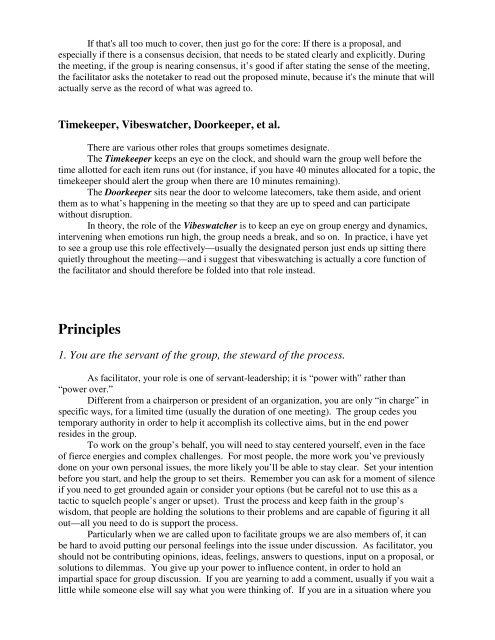GROUP FACILITATION PRIMER.pdf - Tree Bressen
GROUP FACILITATION PRIMER.pdf - Tree Bressen
GROUP FACILITATION PRIMER.pdf - Tree Bressen
You also want an ePaper? Increase the reach of your titles
YUMPU automatically turns print PDFs into web optimized ePapers that Google loves.
If that's all too much to cover, then just go for the core: If there is a proposal, and<br />
especially if there is a consensus decision, that needs to be stated clearly and explicitly. During<br />
the meeting, if the group is nearing consensus, it’s good if after stating the sense of the meeting,<br />
the facilitator asks the notetaker to read out the proposed minute, because it's the minute that will<br />
actually serve as the record of what was agreed to.<br />
Timekeeper, Vibeswatcher, Doorkeeper, et al.<br />
There are various other roles that groups sometimes designate.<br />
The Timekeeper keeps an eye on the clock, and should warn the group well before the<br />
time allotted for each item runs out (for instance, if you have 40 minutes allocated for a topic, the<br />
timekeeper should alert the group when there are 10 minutes remaining).<br />
The Doorkeeper sits near the door to welcome latecomers, take them aside, and orient<br />
them as to what’s happening in the meeting so that they are up to speed and can participate<br />
without disruption.<br />
In theory, the role of the Vibeswatcher is to keep an eye on group energy and dynamics,<br />
intervening when emotions run high, the group needs a break, and so on. In practice, i have yet<br />
to see a group use this role effectively—usually the designated person just ends up sitting there<br />
quietly throughout the meeting—and i suggest that vibeswatching is actually a core function of<br />
the facilitator and should therefore be folded into that role instead.<br />
Principles<br />
1. You are the servant of the group, the steward of the process.<br />
As facilitator, your role is one of servant-leadership; it is “power with” rather than<br />
“power over.”<br />
Different from a chairperson or president of an organization, you are only “in charge” in<br />
specific ways, for a limited time (usually the duration of one meeting). The group cedes you<br />
temporary authority in order to help it accomplish its collective aims, but in the end power<br />
resides in the group.<br />
To work on the group’s behalf, you will need to stay centered yourself, even in the face<br />
of fierce energies and complex challenges. For most people, the more work you’ve previously<br />
done on your own personal issues, the more likely you’ll be able to stay clear. Set your intention<br />
before you start, and help the group to set theirs. Remember you can ask for a moment of silence<br />
if you need to get grounded again or consider your options (but be careful not to use this as a<br />
tactic to squelch people’s anger or upset). Trust the process and keep faith in the group’s<br />
wisdom, that people are holding the solutions to their problems and are capable of figuring it all<br />
out—all you need to do is support the process.<br />
Particularly when we are called upon to facilitate groups we are also members of, it can<br />
be hard to avoid putting our personal feelings into the issue under discussion. As facilitator, you<br />
should not be contributing opinions, ideas, feelings, answers to questions, input on a proposal, or<br />
solutions to dilemmas. You give up your power to influence content, in order to hold an<br />
impartial space for group discussion. If you are yearning to add a comment, usually if you wait a<br />
little while someone else will say what you were thinking of. If you are in a situation where you


